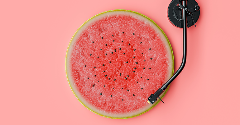News
IFBA releases Ten-Year Progress Report
29 Jun 2018The International Food and Beverage Alliance (IFBA) has released its Ten-Year Progress Report, which details its member companies' cumulative progress.

The International Food and Beverage Alliance (IFBA) has released its Ten-Year Progress Report, which details its member companies' cumulative progress on empowering consumers to eat balanced diets and live healthy lives. A non-profit organization founded in 2008 by the CEOs of leading global food and non-alcoholic beverage companies, IFBA convenes The Coca-Cola Company, Danone, Ferrero, General Mills, Grupo Bimbo, Kellogg’s, Mars, McDonald’s, Mondelēz International, Nestlé, PepsiCo, and Unilever to work toward improving global health and wellness. Please find the full ten-year progress report here and the executive summary here.
“Our member companies are leaders in the industry because they understand that good health and good business go hand-in-hand,” said IFBA Secretary-General, Rocco Renaldi. “IFBA is proud of the work our members have done over the last decade, but we know we’re on a long journey, there’s much more to be done, and we embrace that challenge.” IFBA’s Ten-Year Progress Report details member companies individual and collective efforts related to the organizations’ four core commitments: New & Improved Products + Smaller Portions, Clear & Comprehensive Nutrition Information, Responsible Marketing, and the Promotion of Healthy Lifestyles. IFBA’s commitments are designed to meet the objectives of the World Health Organization and the 2030 UN Sustainable Development Goals of zero hunger and good health and well-being for all. Notable Report Highlights New & Improved Products + Smaller Portions. Over the last decade, IFBA member companies have innovated to improve and create new products—and small and reduced portions—that empower consumers to eat balanced diets. + Tens of thousands of improved and new products worldwide with: less sugar, fats, and sodium, more fiber, whole grains, fruits, and vegetables, more lower and no-sugar choices, and more smaller and reduced portion options. + 98% of industrially produced trans fat eliminated from IFBA members’ products. + 45.5% of IFBA companies’ food and non-alcoholic beverages meet their “better-for you” standardClear & Comprehensive Nutrition Information. Members have enhanced product labels and online and point-of-sale communications with clear, comprehensive, accessible information on nutrition and consumption guidance—so that consumers can make informed choices. + 95% of IFBA members’ products display calories on front-of-pack labels. Responsible Marketing. IFBA companies do not advertise to children under 12 years of age, or if they do, they only promote better-for-you products. Over the last decade, member companies have made dramatic, positive changes to the kinds of products that children see across media platforms. In the US: + 75% of products contain at least a half serving of fruits, vegetable, whole grains, or dairy + Member companies’ cereals contain no more than 10g sugar per serving as of 2015, compared to pre-2007 pledge levels of up to 16g. + 75% of member companies’ cereals contain 0g of saturated fat per serving, 97% have no more than 0.5g saturated fat per serving, and 75%+ contain no more than 170mg sodium per serving + More than 75% of member companies’ cereals contain no more than 170mg sodium per serving + Since 2016, no individual food is more than 140 calories, and no small meals or mixed dishes are more 530 calories In Canada + 64% of products include whole grains, 17% include dairy + Since 2012 no product advertised by participants is more than 200 calories, and every meal is less than 600 calories. Since 2009, Accenture Media Management conducts an annual, independent assessment of member companies’ compliance with our global marketing policy. Accenture Media Management’s latest compliance assessment has been released in conjunction with IFBA’s Ten-Year Report and can be read in full here. Member companies’ latest compliance results (2016-2017) across media platforms, according to Accenture Media Management: + TV: 99.7% in compliance + Print: 47/48 publications in compliance + Brand Websites: 96% in compliance + Brand YouTube Channels: 56/59 in compliance Promotion of Healthy Lifestyles. Our members proudly support and create employee and community programs that promote healthy lifestyles and balanced diets, and foster dialogues with all stakeholders worldwide around cultivating a health promoting-environment. + All 3.5M IFBA member company employees have access to a workplace wellness program. IFBA and its member companies work toward improving the health and wellness of consumers, employees, and communities worldwide by innovating to create new and improved products and small and reduced portions, empowering consumers to make informed choices, collaborating with all stakeholders to find bold, smart, diverse solutions to global health challenges, and inspiring others in the food and non-alcoholic beverage industry to step-up, take action, and proactively 3 report progress. IFBA has proactively reported its progress to the public on an annual basis since its formation in 2008. IFBA is an alliance of twelve international food and non-alcoholic beverage companies - The CocaCola Company, Danone, Ferrero, General Mills, Grupo Bimbo, Kellogg’s, Mars, McDonald’s, Mondelēz International, Nestlé, PepsiCo and Unilever.Related news

Retail landscape lacks nutritious and affordable food, says ATNi
30 Dec 2025
A rapid increase in modern food retail has given retailers growing influence over consumer diets, according to global non-profit ATNi’s latest assessment.
Read more
Debate over ban on ‘meaty’ names for plant-based products reaches stalemate
26 Dec 2025
The debate over a ban on plant-based products using “meaty” terms has reached a stalemate, leaving manufacturers in limbo and still facing overhauls to their marketing and packaging.
Read more
Multi-sensory food and drink products to gain traction in 2026
16 Dec 2025
Trend forecasters predict that sensory elements will play a larger role, helping food and beverage brands differentiate themselves in a competitive market in 2026.
Read more
Big appetite for M&A between European and US food and drink companies
3 Dec 2025
Persistent tariffs on EU food and beverage exports have helped drive record levels of M&A activity between European and US companies this year, according to analysis by ING.
Read more
Non-UPF Program extends certification scheme to entire food industry
30 Nov 2025
The Non-UPF Program has extended its certification scheme to the wider food sector, championing a move towards healthier consumption habits.
Read more
Lancet study links UPFs to chronic disease risk
26 Nov 2025
UPFs are consistently associated with an increased risk of diet-related chronic diseases, according to a comprehensive review of global evidence in The Lancet .
Read more
Concerns swirl around cinnamon’s compliance with EU law
25 Nov 2025
Cinnamon may be a top functional ingredient, but it needs stronger protocols to ensure it meets EU food safety laws and quality standards, say researchers.
Read more
Oat Barista: Innovation for game-changing beverages
20 Nov 2025
Oat Barista is a clean label, sustainable, and innovative drink base specifically designed to create the perfect foam in one single ingredient.
Read more
How younger consumers are redefining ingredient choices and rejecting brand loyalty
18 Nov 2025
Gen Z and millennial consumers’ preferences for transparency, functionality, and purpose are “redefining the very nature of consumption itself”, says SPINS.
Read more
Hybrid formats and flexible positioning to disrupt category norms in 2026
17 Nov 2025
Trend forecasters expect food and drink to move more fluidly across occasions, functions, and formats as consumers seek versatility, novelty, and convenience.
Read more